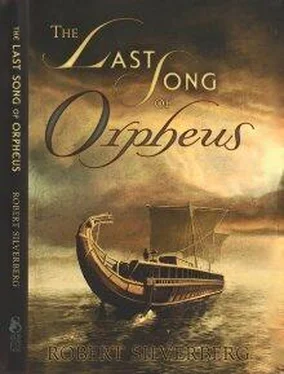We made camp on the shore. Within a couple of hours Heracles returned from the interior, dragging behind him a colossal fir tree that he set about trimming to shape. Meanwhile, though, Heracles’ squire Hylas, had gone off toward a nearby pool to fetch water, and had not returned. This Hylas was a pretty young man whom Heracles, who had taken him as a lover, had insisted that we bring with us on the voyage. Jason had sent staunch Polyphemus the Arcadian, one of our most sober and reliable men, to find him, and he had not returned either.
After a while Heracles noticed that Hylas was not in the camp, and when someone told him where he had gone and how long he had been absent, Heracles went rushing off into the forest, frantically shouting his name. What happened after that I learned many years later, when I encountered Heracles in Thrace. In the forest he found only Polyphemus, who had been to the pool and discovered Hylas’ water-pitcher lying abandoned beside it. Of Hylas himself there was no trace, and Polyphemus suggested that the pretty boy had been carried off by nymphs of the pool or forest who had taken a fancy to him. Heracles, with a great roar of rage, cried that they must search until they found him, and so they did, for when dawn came there was no sign in camp of either man, let alone the one for whom they had gone in search.
Meanwhile a fair breeze had sprung up at last, and to the astonishment of everyone Jason gave the order for us to resume the voyage. “But where is Heracles?” Admetus of Pherae asked, as we settled into our places aboard the Argo . “Where is Polyphemus?” Others—Peleus, Acastus—took up the cry. Jason, glowering, merely shrugged and said the gods wished us to be on our way, and that he was not going to offend them by waiting any longer for Heracles and Polyphemus. Nor did we, though there was a noisy quarrel first, Admetus claiming that Jason was marooning Heracles out of jealousy, because Heracles had humiliated him by rowing so vigorously that Jason had been outmanned at the oars. To this accusation Jason made no answer, but simply went about directing the raising of the mast and the hoisting of the sail. In the end Mopsus the Lapith, who had the powers of a soothsayer, ended the wrangling by going into a trance, or pretending to do so, and announcing that it was the will of Zeus that Heracles and Polyphemus be left behind, for great-thewed Heracles was so rash that he would endanger the expedition when it came to the land of the Golden Fleece, and Polyphemus was needed for some task in another place. So we went on, having lost the services of two of our most valuable shipmates.
We were to have yet another such unhappy landing farther along. In the land of the Doliones we were given a warm welcome by Cyzicus, their king, but when we took our leave a contrary gale seized hold of us in the night, swinging us about in the sea and sending wild waters spilling across our deck, and carrying us back all unawares to the harbor from which we had just set out; and Cyzicus, thinking his city was being attacked by pirates, led an armed force out against us as we came ashore. In the darkness and confusion we slew our former host and a great number of his stalwart men. I watched the carnage from one side, for I am not a warrior and the taking of life is not what the gods meant me to do; but I knew that this tragic error could not be prevented, and though I did not slay, neither did I do anything to intervene.
Afterward we held funeral games in Cyzicus’ honor, and sacrificed many a beast in atonement for the bloodshed we had unwittingly brought about, but even so we were kept in harbor for twelve days by foul weather before we could at last depart from that sorry land. Great was my own regret that I could not have averted this sad mistake; but I knew that I had to let events unfold, for King Cyzicus, despite his kindness to us, had been marked for death by the goddess Rhea, whose sacred lion he had slain on Mount Dindymum. We are eternally caught up, mortals and demigods alike, in the larger patterns that the gods have decreed.
Nor did we bring great joy to our next port of call. The isle of Bebrycos was ruled by the savage King Amycus, who fancied himself a great boxer and would give us neither food nor water until one of our men fought a contest with him. We learned that Amycus invariably won these matches and put the loser to death, and that any voyagers who refused to meet his challenge were summarily flung over the side of a cliff into the sea. Well, we sent our gallant Polydeuces against him, he who had been the victor time and again in the Olympic Games, and although Amycus was as strong as a bull and a ferocious boxer besides, Polydeuces was more skillful and struck him such a blow that he fell down dead. This led us into a battle with the infuriated Bebryceans, and once again our swordsmen were forced to slay many of them in our own necessary defense. You who live after us will say that was a cruel age, our age, and indeed it was: many good men fell in such needless quarrels, for when strife arose our heroes looked upon the shedding of blood as unavoidable. Since Amycus was said to be yet another son of Poseidon, we placated that god by sacrificing twenty red bulls to him that we found in the city, and put to sea the next day.
Now we were approaching the Hellespont. We had been warned that the watchful men of Troy maintained a close surveillance over its eastern shore and would attack any vessel that approached their territory, so we took the precaution of painting our handsome white sail with the black ink of cuttlefish ink, which royal Peleus had brought along to be used in flavoring our stews and porridges. It was a sad thing to expend that delectable stuff for such a purpose as this, but we feared that the Trojan watchmen would see the glint of moonlight on our bright sail as we passed by; and so we mixed the cuttlefish ink with water and painted our sail until it was an ugly muddy hue. And by such a deception we went safely past the vigilant guardians of the great city of Troy and entered into the Hellespont.
Beyond that strait lay a second and larger strait, the Bosphorus, that narrow stretch of swift water that would carry us into the Euxine Sea. But legend had it that at the upper end of the Bosphorus the way was barred to navigators by the Clashing Rocks, two floating islands that constantly tossed and heaved. When—so it was said—any ship began to enter the passage, the rocks would come together as though they had been endowed with malice, grinding and crushing the unfortunate craft that was passing between them. It was King Pelias’ hope that that fate would befall the ship of Jason and his comrades and put an end to whatever threat Jason posed to his own reign; and so he had compelled Jason to take the sea route to Colchis, knowing it must inevitably send him through the Clashing Rocks.
Many of our Argonauts believed in miracles and never doubted that the Argo would safely reach Colchis or that the Golden Fleece would fall readily into Jason’s hands, and they gave little thought to the difficulties that these rocks presented. “Can you charm them into holding still as we go past?” more than one of them asked me. I simply smiled. I know what power my music holds, but also I know what it cannot achieve, and there was no way that the sounds of my lyre could keep those huge rocks from bobbing as they wished on the breast of the tossing water. But Jason, for all his valor, was a brooding fearful man, and although he had forced himself not to think about the Clashing Rocks in the early days of our voyage, he quite openly began to wonder now what chance we had of surviving that fearful passage.
Our shrewd helmsman Tiphys, it was, who set his mind at rest. Pointing ahead along the coast of Thrace, he said calmly, “Before us lies Salmydessus, whose king is Phineus, the son of Agenor. He knows the secret of the rocks and will tell us how to get ourselves safely through their jaws.”
Читать дальше












